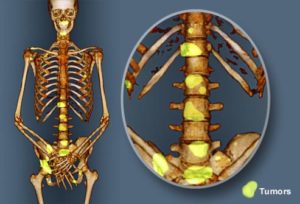
Recently Diagnosed or Relapsed? Stop Looking For a Miracle Cure, and Use Evidence-Based Therapies To Enhance Your Treatment and Prolong Your Remission
Multiple Myeloma an incurable disease, but I have spent the last 25 years in remission using a blend of conventional oncology and evidence-based nutrition, supplementation, and lifestyle therapies from peer-reviewed studies that your oncologist probably hasn't told you about.
Click the orange button to the right to learn more about what you can start doing today.
- You are here:
- Home »
- Blog »
- Multiple Myeloma »
- Non-Secretory Myeloma “Survived Significantly Longer than Secretors”
Non-Secretory Myeloma “Survived Significantly Longer than Secretors”

“The non-secretory survived significantly longer that the secretors, median 46 months versus 21 months (p less than 0.01).”
Early detection is a critical prognostic indicator in all cancers. If your cancer is diagnosed early, your prognosis is usually much better- meaning that your odds of living longer are much better. By definition, non-secretory multiple myeloma is an early MM diagnosis because the majority of MM patients are diagnosed when their myeloma is more advanced- say stage two or three. Advanced MM is more difficult to treat than early MM.
I was diagnosed with non-secretory multiple myeloma in early 1994 about eight years after the study linked and excerpted below was published. Like the study highlights, I presented with:
- neurological aspects (cord compression)
- minimal lytic bone disease,
- a lower median percentage of plasma cells in the marrow and
- I don’t know what “Hypogammaglobulinemia” so I don’t know how it applies to me-
Unfortunately, after aggressive conventional therapies including a lot of radiation and all sorts of chemotherapy, my oncologist told me that there was nothing more that she could do for me. This pronouncement was in September of 1997 about 44 months after my original diagnosis.
For a non-secretor with minimal lytic lesions at my original diagnosis, I should have made it for at least 74 months. I can’t help but wonder what happened…
I’m pretty sure I was misdiagnosed…
Have you been diagnosed with non-secretory multiple myeloma? Scroll down the page, post a question or comment and I will reply to you ASAP.
Thank you,
- MM Survivor
- MM Cancer Coach
- Director PeopleBeatingCancer
Recommended Reading:
- Multiple Myeloma Cancer Coaching- Introduction
- Chemotherapy For Multiple Myeloma: An Overview of Options and Side Effects
- Myeloma “Miracle Cancer Cures” Pros and Cons-
Non-secretory multiple myeloma: a report of 13 cases with a review of the literature.
Hematol Oncol. 1986 Oct-Dec;4(4):307-13.
The clinical features of 13 patients with non-secretory myeloma from a series of 172 consecutive multiple myelomas are presented. The non-secretors survived significantly longer that the secretors, median 46 months versus 21 months (p less than 0.01).
- Non-secretory myeloma was associated with a higher incidence of neurological presentation,
- minimal lytic bone disease,
- a lower median percentage of plasma cells in the marrow and
- a lower incidence of hypogammaglobulinaemia
The median survival of the non-secretors with minimal lytic bone lesions was 74 months compared to 21 months for those with extensive bone disease. The superior survival of non-secretors is thus thought to be due to earlier presentation possibly as a result of a tendency to form symptomatic local tumours. Retrospective immunoperoxidase staining of stored tissue was performed in nine cases. In only one of these was a monoclonal immunoglobulin not detected indicating that true ‘non-production’ is rare.
In four patients who produced a biochemically detectable paraprotein during the course of their disease and in whom immunoperoxidase data was available the immunoglobulin was of the same type. Immunoperoxidase staining may help in the initial diagnosis of non-secretory myeloma but did not contribute any prognostic information.”


